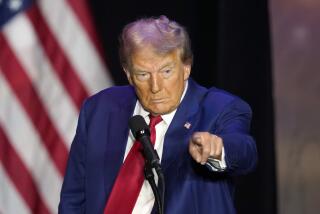Undecided voters are a tiny cohort that may not matter in the end
Undecided voters, you can run but you cannot hide. Turn on your TV and find wall-to-wall attack ads designed to scare you. Answer your phone and find pollsters trying to pick your brain. Answer the door and somebody hoping to win your vote will be on your doorstep – maybe even an actual candidate for president or vice president.
Polls indicate 98% of Americans have made up their minds about the choice between President Obama and Mitt Romney. That makes the 2 percent who are still thinking it over (or failing to think about it at all) a prime focus of attention for both campaigns and for the media and pollsters who are following the race for the White House.
In reality, though, it is not even 2 percent of voters who are getting the attention, it is a much smaller subset of that small electoral sliver: undecided voters in the eight states that are still not solidly in one camp or the other. There are actually so few voters in play that all the tens of millions of dollars being spent on attack ads might be better spent by simply paying each one of these vacillating voters for their vote. Maybe $50,000 each would do the trick.
But no, it is not going to be that pleasant for the befuddled few who just cannot decide. Instead of cash, they are going to be force-fed stories about how Romney got rich and ruined lives by closing companies during his tenure as boss at Bain Capital. They will hear over and over again how Obama has only made a bad economic situation worse and is keeping struggling parents up at night worrying about their children and the taxes and debt that the president plans to pile on their tender shoulders.
Judging by some of the statements undecided voters have made to the news media, though, it may be that all these overtly mendacious attack ads meant to sway them are simply having a dispiriting effect. Rather than making a choice, the undecideds may decide that both candidates are unworthy of their support and they may not vote at all.
With nearly two months still to go, it is too early to say for sure that the race is set in stone. The presidential debates are to come next month, and a stellar performance (or, more likely, a huge gaffe) by one candidate or the other could alter the perceptions of a significant number of voters. An unforeseen event -- such as this week’s attacks on the American Embassy in Cairo and the killing of the U.S. ambassador and three other Americans at the consulate in Benghazi, Libya – could shake up the race. But right now, it looks as if the victor on election day is likely to be the man who most effectively mobilizes the voters who already have made up their minds.
In the end, those few who are slow to choose may not matter much at all.
More to Read
A cure for the common opinion
Get thought-provoking perspectives with our weekly newsletter.
You may occasionally receive promotional content from the Los Angeles Times.











